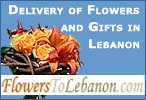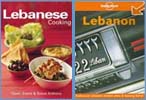|
 Home
> General Information
> Travel Essentials Home
> General Information
> Travel Essentials
Introduction | Facts | Travel Essentials |
Geography and Climate |
Language
Culture and Religion |
Economy and Government |
Night Life |
Sports
Prepare your trip to Lebanon with the following information:
| |
Passport: |
A valid passport is required for 3
months by all, except nationals of Syria arriving from their country with a
valid national ID. The Government of Lebanon refuses entry
to holders of Israeli passports and holders of passports containing a
visa for Israel, valid or expired, used or unused. |
| |
Visa: |
A valid visa is required by all except the
following: (a) Nationals of Syria for stays of up to 6 months, and (b) Transit
passengers continuing their journey by the same or first connecting aircraft
provided holding onward or return documentation and not leaving the
airport. |
| |
Currency: |
The currency for Lebanon is Lebanese
Pound (L£) = 100 piastres. Notes are in denominations of
L£100,000, 50,000, 20,000, 10,000, 5000 and 1000. Coins
are in denominations of L£500, 250, 100 and 50. There are a large number of banks in
Beirut where international currencies can be exchanged. Unofficial money
changers also operate and some hotels offer exchange services. US
Dollars are best and do not need to be exchanged as they are accepted
everywhere, even in small shops. |
| |
Cards and Cheques: |
The credit cards that are excepted are:
MasterCard, American Express, Diners Club and Visa. They are accepted by
airlines, hotels, restaurants and larger shops... whereas a limited acceptance of travelers cheques
is excepted in Lebanon, as major banks only accept certain types of travelers
cheques. Travelers cheques also require up to 2 weeks to clear and are
therefore generally not recommended. |
| |
Timezone: |
Lebanese time is GMT+2 hours in winter (October to March)
and GMT+3 hours in summer (April to September) when daylight savings time is observed. |
| |
Banking Hours: |
The hours are from 0800-1230 (for money
withdrawals) and 1230-1400 (for other services). |
| |
Duty Free: |
The following goods may be imported into
Lebanon without incurring customs duty: (a) 200 cigarettes or 20 cigars or 200g
of tobacco, and (b) 2 bottles of alcohol. |
| |
Health: |
Lebanon is a developed country with relatively good
health facilities. Similar to travel to other foreign countries, hepatitis A and B vaccines
are recommended; also make sure tetanus-diphtheria and measles vaccinations are up-to-date.
A typhoid vaccine is also recommended for travel to Lebanon. A yellow fever vaccination
certificate is required from travelers arriving from infected areas, and health
insurance is essential. Note that although Lebanon's tap water is considered safe to drink,
it is probably best to drink bottled water.
|
| |
Getting There: |
By Air: The national airline is
Middle East Airlines (MEA), which operates regular direct
flights everyday with many cities of the world.
By Sea: The main
international ports are Beirut, Tripoli, Jounieh, Tyre and Sidon. Cruise ships
are available from Jounieh.
By Road: The international routes are via Turkey
and Aleppo Homs and Lattakia in Syria along the north-south coastal road, and
also the Beirut Damascus trunk road. Bus services are available from
Europe. |
| |
Getting Around: |
By Road: Traffic drives on the right.
Speed limit signs, traffic police and traffic lights are present but may not
always be respected and driving, particularly in Beirut, can be quite
unpredictable. As public transport is limited, roads in Beirut are
overcongested.
(a) Taxi: Inter-city taxis operate throughout Beirut and
Lebanon. Travel is normally shared. Prices are negotiated in advance. Town
taxis have red licence plates and an official tariff.
(b) Car hire:
Self-drive cars are available, but chauffeur-driven vehicles are recommended.
An International Driving Permit or Green Card insurance are required.
(c)
Public bus: Services are available in Beirut, where bus services have recently
been expanded, although service taxis remain the most widely used option.
|
| |
Social Conventions: |
Lebanese people are known for their
hospitality. Handshaking is the normal form of greeting. It is acceptable to
give a small gift, particularly if invited at home for a meal. As far as dress
is concerned, casual dress is suitable for daytime wear, except in main towns
where dress tends to be rather formal. Smarter hotels and restaurants often
require guests to dress for dinner. Smoking is common and acceptable unless
specified otherwise. |
| |
Tipping: |
In hotels and restaurants, a tip of
between 5% to 10% of the bill is expected. |
| |
Electricity: |
Electric current is 220 Volts, alternating at 50 cycles per second.
If you travel to Lebanon with a device that does not accept such voltage,
you will need a voltage converter. A two-pin plug, with round pins is commonly used
(Type C, similar to many European countries).
|
Introduction | Facts | Travel Essentials |
Geography and Climate |
Language
Culture and Religion |
Economy and Government |
Night Life |
Sports
|









